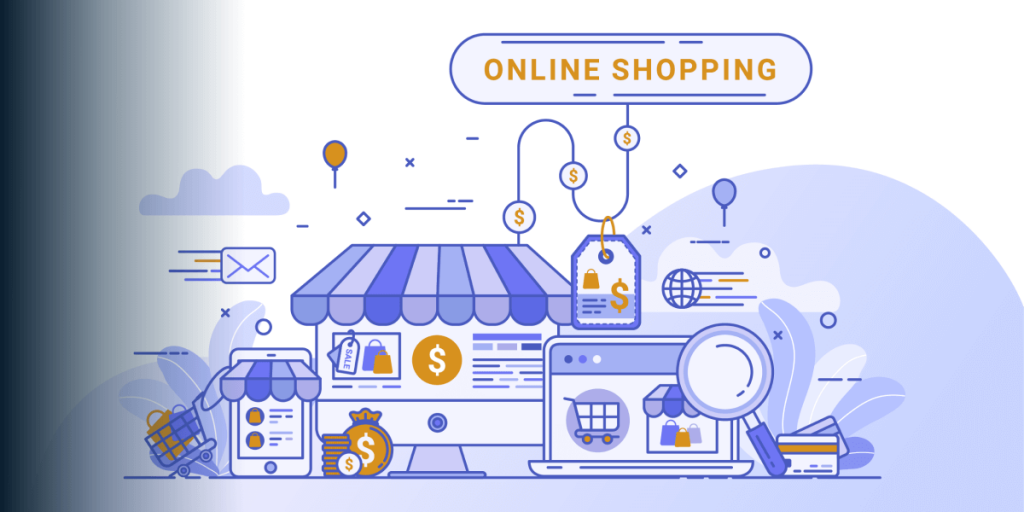Why is a Customized eCommerce Platform a Great Idea?
Are you interested in developing a customized eCommerce solution but you are not sure if this is the best solution for your business? In a highly competitive market, starting an online business can be challenging, especially in terms of technology and products. We believe that you should gather as many details as possible about all the achievable ways to kick-start your project, but at the same time, think about scalability and long term growth.
In this article, we are going to take you through the reasons why a custom eCommerce website is a great idea and what you will win by taking this decision.
What is a Customized eCommerce Platform?

An eCommerce platform is a software application where online businesses can manage their website, marketing actions, sales, and operations. Besides that, they have specific eCommerce features such as payment options, shipping methods, etc. and can be integrated with other business tools, to ensure the functionality and operations. A custom eCommerce is built specifically to meet your business needs and goals. There will be no other website like yours. Moreover, you can personalize it as much as you want, based on where your company stands now and where it will go in the future.
Why Should You Consider Investing in a Custom eCommerce Platform?
When building your website, think of building a house. The most important part of it is the foundation. You wouldn’t build a house on a foundation of moving sand, so why would you build your site on a poor platform? Maybe you think that free web hosting is a great idea for saving some money, finding cheap payment process plugins, choosing a good looking theme, and adding other free or cheap basic features that in the end will slow down your website. The outcome will be worse than imagined. Your website can be hacked because of lack of security, servers will go down regularly, and you can experience other repeated issues that might cost you more money, resources, and time fixing them. The saddest part of all of this, is that you cannot do much about it, because the eCommerce platform won’t allow any changes, or they are very expensive to implement.
Let’s look at some facts about online shopping behaviour. Now is a great time to start selling products online because the eCommerce sector is growing by 23% every year. 67% of millennials, prefer to shop online rather than going into physical stores and they spend around 6 hours per week doing so. This means people spend a lot of time navigating the web, searching for products and services to spend their money on. More than that, millennials are growing older and become more wealthy, which means more sales for eCommerce stores. The eCommerce environment is getting stronger as more than 80% of the online population is using the internet to purchase goods or services.
But just owning online stores will not guarantee your success. As a business owner, you should know that your business will need grooming when it comes to performance optimization to be on top of your competition. Also, you need to invest in digital marketing efforts to create brand awareness, increase website traffic, create brand loyalty, and increase your return of investment (ROI). Do not forget that mobile solutions are mandatory for your online business, as more than 60% of website visits come from mobile devices. Mobile usage has exceeded desktop since 2016, and having a mobile-friendly website is crucial right now.
Therefore, considering everything, we advise you to acknowledge the importance of a custom solution, a powerful platform that can satisfy your current and potential customers needs, bring value to your brand, and ensure long term success with a maximized revenue.
What Is Important for Custom eCommerce Websites?

eCommerce platforms are different from other website types because of their specific features. The most important functionality of eCommerce websites is related to the purchasing process. You can find on the market plenty of off-the-shelf eCommerce platforms such as Prestashop, or Shopify. You can use open-source platforms built on WordPress, such as Woocommerce, but they won’t be able to cover all of your business requirements and you won’t be able to stand out from the crowd.
The first thing we recommend is building a clear, intuitive, and easy navigation menu, filters, and checkout page. Your clients are looking for these vital features to help them navigate through various product categories and items on your website. In case your visitors have issues with using your site, they will look for simplicity on your competitor’s sites.
Next, we suggest you consider an omnichannel approach. This means using all your channels to create one, unified customer experience. This includes offline and digital channels, in-store, and your online e-commerce website. What is important is that your customers have the same experience with your physical products and digital products. This approach is the first step to provide a seamless and unified shopping experience from the first interaction to the last. Nowadays, people value the power to switch between different devices and get the same experience on each of them.
Another important factor that should not slip your mind is to have inclusive product descriptions. Based on the CSA survey 98% of users will not complete a purchase if the information on the website or mobile app is incomplete or incorrect.
Customer service should be on point as 80% of consumers want brands to be available 24/7 and to receive quick updates regarding their purchases. We recommend adding a chat on your website to facilitate the communication process.
The most demanded features that buyers expect to find on a website are the tracking shipment details, information about refunds, and returns. Free shipping would be a very nice touch that will increase your sales, as 93% of users are more likely to complete a purchase if they receive free shipping.
Do not forget about SEO optimization as organic traffic is the decisive factor for brand visibility. 51% of the total site traffic comes from organic searches. Being present, especially, on the first page of SERP (search engine results page) is the key to a successful business, as over 70% of people do not go further than the first page of results after their search.
What Makes a Custom eCommerce Software a Great Idea for Any eCommerce Business?

If you want your ideas to materialize and your vision to be brought to life, then building a custom e-commerce platform is the best solution. In one word, freedom is what you get, and let us explain to you why.
Almost all already-built platforms come with restrictions, limitations, or very expensive extra implementations. Besides, they are designed to fit a large scale of industries, and when you decide upon this type of software, you will receive all the features included in the package, without the possibility of further customization. If you have particular plans for your company, these restrictions will keep you from achieving your business’ full potential.
With a custom eCommerce solution, you have full control over everything because you own it. With off-the-shelf software, you cannot control the updates or features that are being implemented in the long run. You must accept them even if you don’t want or need them. Or you might need an update, but you have to wait until the platform’s developers decide when they will take action. Businesses that invest in being different, offering an outstanding user experience, and building brand loyalty, prefer having freedom and flexibility. Choose to have complete ownership of your online presence, brand image, and be the ultimate decision-maker on how your website runs.
Having control means having flexibility over the design templates, the recurring theme on the site, you will dictate the features to be included and how to be implemented to perfectly fit your business needs. Moreover, you can keep your content management system (CMS) assets that you find useful, and by building a custom eCommerce site, it is easy to have it done and integrate the key business software, extensions, and other advanced features that allow you to conduct your business the way you want.
Simplify the workflow with a custom platform that not only affects your customers but some of your departments that are using the platform’s integrations as well. Think about your inventory and products catalogue, customer base, advertising, analytics, accounting, etc. and make it easy to use and intuitive.
Because it is a very complex process to build your site from scratch, we recommend you to find a software development company that can turn a basic version of your website into an innovative sales tool. We can help you with the development of your custom eCommerce solution and tailor it to perfectly fit your needs, goals, and business model. It is easy to work with us, as we are going to do all the hard work for you. Contact us and let’s build your dream site. Check out our portfolio and our fashion eCommerce case study for more details on how we approach our partnerships.
Core Functionalities of eCommerce Websites To Take Advantage Of

After you’ve built your eCommerce website from scratch, it is time to choose and implement the core functionalities that define this type of site. Generally, these features are included by default for every store, but at the same time, they might differ and you can add custom features to accommodate your business needs.
The registration process can be implemented in different ways. We recommend you to take advantage of your accounts on social networks such as Facebook and Instagram, emails but do not forget to add the option of adding a phone number, or two-factor authentication for security purposes.
Your eCommerce website design must ensure an easy product search and allow product reviews. These factors will create a smooth and flawless user experience, will build and increase the trust in your brand. An easy-to-navigate interface and having your visitors find the wanted products within milliseconds is the key to increase conversions. By allowing buyers to leave reviews will demonstrate that you are an honest company and you value your customers and their opinion.
User profile creation is a great way to increase your email marketing lists. Besides that, the profile is a must-have feature for all eCommerce sites. This integration has multiple benefits for your users and your email marketing actions. Under the profile sections, users can provide personal information, birth date, can create and update wishlists with their favourite products, can track their orders and payment history. Your marketing efforts can include special discounts for users’ birthdays, special offers for products in the wishlist, free shipping promotions, a coupon or voucher discount for registration, etc.
The product page is the most fundamental feature for your online store. What you should include on this page is all the information about that product, images of it, both long and short descriptions, special characteristics, and in case you have a clothing store, do not forget to add a size guide. We suggest you take advantage of the product page. You can ask your buyers to upload a photo with your product while they are wearing or using it.
The checkout process is composed of two important parts: the cart and the payment methods such as PayPal, credit card, and other payment gateways that are popular in your country. The credit card payments option should be on top of your list. Shopping carts and payments are the features that make an eCommerce site function. This process is also helpful for your marketing activities such as sending out emails on cart recovery, reducing the cart abandonment rate, etc.
The content management system admin panel is a part of your site that is not accessible to your customers. This is specially created to be used by internal teams. We suggest you build an easy-to-use CMS that includes features for catalogue management such as product categories, brands, etc. and also consider it for content management for product pages, blog articles, banners, system messages, etc.
The dashboard is crucial and its core functionality will help site owners and administrators to monitor site statistics and analytics. Make sure your dashboard is interactive and provides reports, charts, and statistics about sales, store performance, and offers an overview of customer behaviour. This data will help you identify specific patterns of your users and will allow you to compare information from different timelines.
Another important thing to have in mind is the integration with third parties. Think of delivery systems, email marketing tools such as MailChimp, social media, and other services you and your users need.
This list might look long, but these are very important functionalities of an eCommerce store. What you should keep in mind is that all the work is mostly done in the back-end, and your users will only see the quality of it. That is why we strongly recommend you to look into building a custom eCommerce platform so everything can be done exactly how you want it, fits like a glove on your needs and goals, and you have 0 restrictions on functionality changes, design, additional features, the possibility of adding unlimited products, integrations, content, etc.
Our Expertise

As eCommerce is a very tough environment, being better than your competitors is a must. It is not easy to stand out, but we can help you with that. From an eye-candy web design to a customized checkout process, or a top-notch customer relationship management (CRM), we have the right expertise to put your business on top of your competitors.
The backbone of a strong business is research. This includes market research, user behaviour, industry trends, competitors, etc. After gathering all the needed information, the next step is to focus on the sales funnel. From information architecture, prototyping and testing, error prevention, web design, mobile responsiveness, and digital marketing, we have a great team of experts that can build your dream eCommerce website.
This case study describes our approach to the project step-by-step, including the custom features and integrations we built for our partner. The results we got after the launch of the website were great. In the first two months, we increased the website traffic by 58% in the first month and 79% in the second month. The average position in SERP was 6.2 in less than four months, and they had 328 products sold in the first month.
Contact us and let’s talk about ways we can build an eCommerce business the way you want!
Frequently Asked Questions
We recommend you make a list of the things you want to have on your new platform such as payment options, design options, security, room for growth, etc. and choose what gives you the most freedom, flexibility, and expansion.
Extremely important! 60% of all traffic comes from mobile devices. Having a mobile-friendly website means reaching new audiences, expanding your visibility, and increasing conversions.
A custom eCommerce solution can be integrated with any system you use right now. An already built solution might not be compatible with it.